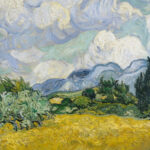From the Patron Saint of Animal rights activists – Saint Francis of Assisi; to Arms Dealers – Saint John the Evangelist; to Zoologists – Saint Albertus Magnus, there may be a saint for almost any need. Wikipedia even publishes a list of Catholic saints and their patronage by occupation and activity.
The plethora of Patron Saints has even affected my life. My five-year-old brother was diagnosed with leukemia around the time of my birth. So…what do young Catholic parents do, without the medical advances we now have, when faced with such a dire situation? Of course, they name their next son; me, after the Patron Saint of Hopeless Cases – Saint Jude Thaddeus. Thanks, mom and dad! My brother died from the disease, and I know I’ll see and be with him in heaven for eternity. In the meantime, I’ve been encumbered with what Johnny Cash sang about in “A Boy Named Sue” and – “I tell ya, life ain’t easy for a boy named Thaddeus either.”
Sainthood in the Catholic church has sometimes had an inglorious history. Reportedly, a local church in Sweden once canonized an alcoholic monk who was killed in a bar fight – hardly grounds for martyrdom. And bizarre things have been claimed about some of the saints. For example, Saint Aloysius Gonzaga, the patron saint of AIDS, is said to have uttered “Jesus” and “Mary” as his very first words. Even angels have been anointed saints, as Michael the Archangel and Gabriel are the patron saints of Airborne Paratroopers and Communications.
Because of past indiscretions, church leadership has formalized a process to approve someone as a saint. This procedure includes Candidacy, whereby panels of Theologians, Cardinals, Bishops, and even the Pope review a prospect’s life and death. The next stage is Beatification, where a verifiable miracle is required for any non-martyred candidate. At this point, they are declared Blessed. In the final stage, another miracle is needed for both Blessed martyrs and non-martyrs. Once this miracle is confirmed, they are Canonized. This authorizes public veneration by all Church members and the conferring of the title – Saint.
The Catechism of the Catholic Church (CCC 1192) records that “Through sacred images of the holy Mother of God, of the angels and the saints, we venerate the persons represented.” According to The Catholic Company, this veneration occurs because, among other things, “God grants miracles, favors, and grace through the saint’s intercessory prayer.” But when miracles, favors, and especially salvation grace are claimed, it is easy to deduce that veneration may cross the line into worship.
Biblical Saints
“Hagiois,” the Greek word for saint, means “set apart, holy, and sacred.” Throughout the Bible, there are no super saints; none set apart to be venerated, none that grant miracles, favors, or grace through veneration and intercessory prayers. Neither Mary, Joseph, Peter, Michael the Archangel, nor any Old Testament prophets are ever called Saint.
Who, then, are the saints in the Bible? They are “all who believe” and have received the gift of salvation. The Bible consistently refers to the collective members of the church as saints. Ephesians 1:1, for example, starts out, “To the saints who are at Ephesus…” Acts 9:32 records, “…as Peter was traveling…he came down also to the saints who lived at Lydda.” And Romans 1:7 is even more explicit about inclusiveness when it says, “to all who are beloved of God in Rome, called as saints…”
Believers are never commanded in the Bible to worship, pray, or venerate any saint. In the Book of Revelation 19:10, John is even admonished by an Angel when he “…fell at his feet to worship him. But he said to [John], ‘Do not do that! I am a fellow slave with you; worship God!’” Again, in 22:9, John was reminded, “Do not do that! I am a fellow slave with you; worship God!”
Now to be sure, God used specific people to achieve His purposes. But God used imperfect people, not individuals who are so unique and holy that the first words out of their mouths, as infants, are “Jesus” and “Mary.” These were people full of faults and distrust. In Numbers 11:21-22 Moses doubted God could use him to lead Israel out of Egypt. Gideon, in Judges 6:8, doubted God could use him to turn the tide against Israel’s oppressors. The Apostle Peter is on record for having denied Christ three times in Matthew 26:69-75, and the Apostle Thomas in John 20:25 even doubted Jesus rose from the dead.
As opposed to awesome holy people whom God wants us to venerate; these were imperfect people whom God used despite their flaws. Their righteousness was not self-generated; their righteousness was imputed by the perfect righteousness of Jesus Christ. God makes us righteous and saves us, not holy men, women, and angels – saintly or not.
Should we Pray To and Venerate Saints?
We are commanded only to worship God as Psalm 95:6-7 stipulates, “Let us worship and bow down…before the Lord, our Maker. For He is our God.” In the New Testament, Romans 12:1 states, “I exhort you…to present your bodies as a sacrifice…pleasing to God, which is your spiritual service of worship.” In Exodus 20:3-6 we are to have no other Gods before us, nor worship any other graven images.
Revelation tells us we are not to worship angels and declares that angels are “fellow slaves.” The Bible uses this same terminology for believers – Ephesians 6:6 expresses “…as slaves of Christ…,” and 1 Peter 2:16 states “…live as God’s slaves.” Therefore, we are commanded not to worship or venerate fellow slaves; angels, or believers.
Clearly, we’ve run out of prayer, worship, and veneration alternatives outside of God and God alone.
Biblical Christianity teaches that we are to (1) pray to the Father as Matthew 6:9 teaches, “Pray then like this: Our Father…,” (2) through the intermediary and in the name of the Son, Christ Jesus, which according to John 14:6, declares “…no one comes to the Father except through me,” and (3) in the power and guidance of the Holy Spirit which Romans 8:26 articulates “Likewise the Spirit helps us in our weakness. For we do not know what to pray for as we ought, but the Spirit Himself intercedes for us…”
The Bible teaches us to pray to, venerate and worship only God. Not Mary. Not Joseph. Not the Angels. In addition, the Father gave us His Son as our sole mediator and the Holy Spirit as our sole guide.
Why would we want more less than God Himself?









